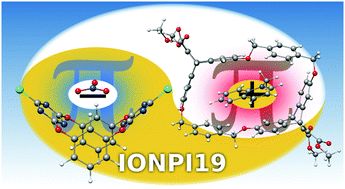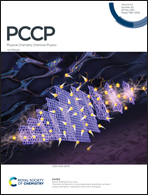Benchmarking London dispersion corrected density functional theory for noncovalent ion–π interactions†
Abstract
The strongly attractive noncovalent interactions of charged atoms or molecules with π-systems are important binding motifs in many chemical and biological systems. These so-called ion–π interactions play a major role in enzymes, molecular recognition, and for the structure of proteins. In this work, a molecular test set termed IONPI19 is compiled for inter- and intramolecular ion–π interactions, which is well balanced between anionic and cationic systems. The IONPI19 set includes interaction energies of significantly larger molecules (up to 133 atoms) than in other ion–π test sets and covers a broad range of binding motifs. Accurate (local) coupled cluster values are provided as reference. Overall, 19 density functional approximations, including seven (meta-)GGAs, eight hybrid functionals, and four double-hybrid functionals combined with three different London dispersion corrections, are benchmarked for interaction energies. DFT results are further compared to wave function based methods such as MP2 and dispersion corrected Hartree–Fock. Also, the performance of semiempirical QM methods such as the GFNn-xTB and PMx family of methods is tested. It is shown that dispersion-uncorrected DFT underestimates ion–π interactions significantly, even though electrostatic interactions dominate the overall binding. Accordingly, the new charge dependent D4 dispersion model is found to be consistently better than the standard D3 correction. Furthermore, the functional performance trend along Jacob's ladder is generally obeyed and the reduction of the self-interaction error leads to an improvement of (double) hybrid functionals over (meta-)GGAs, even though the effect of the SIE is smaller than expected. Overall, the double-hybrids PWPB95-D4/QZ and revDSD-PBEP86-D4/QZ turned out to be the most reliable among all assessed methods for the description of ion–π interactions, which opens up new perspectives for systems where coupled cluster calculations are no longer computationally feasible.

- This article is part of the themed collection: 2021 PCCP HOT Articles


 Please wait while we load your content...
Please wait while we load your content...